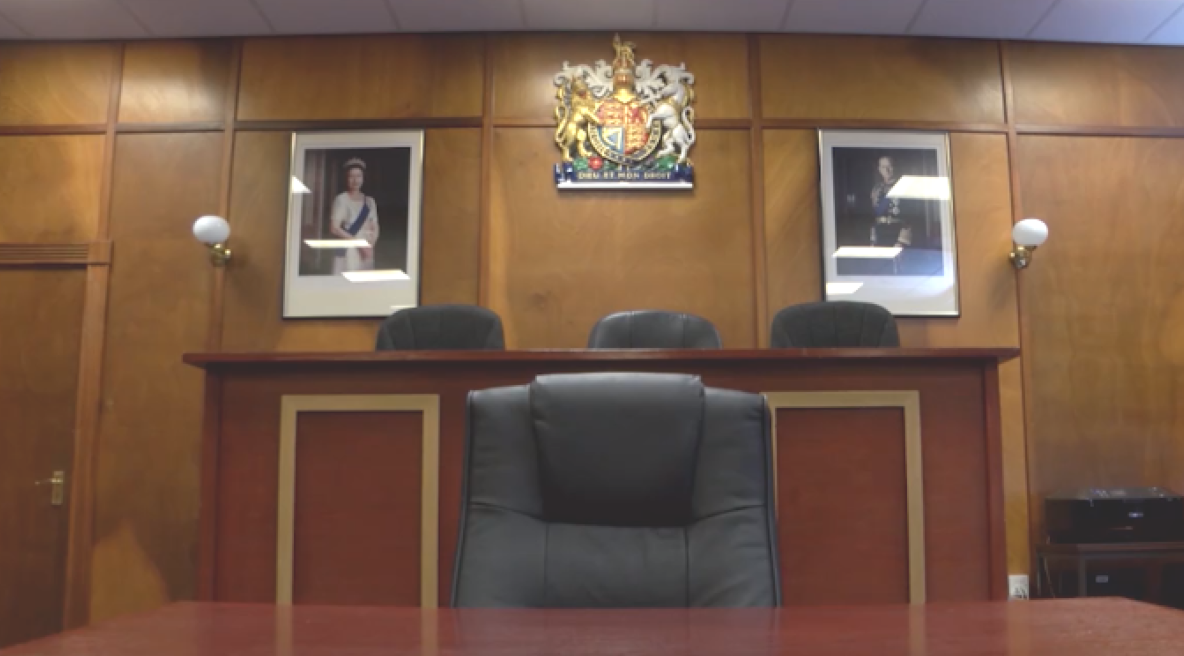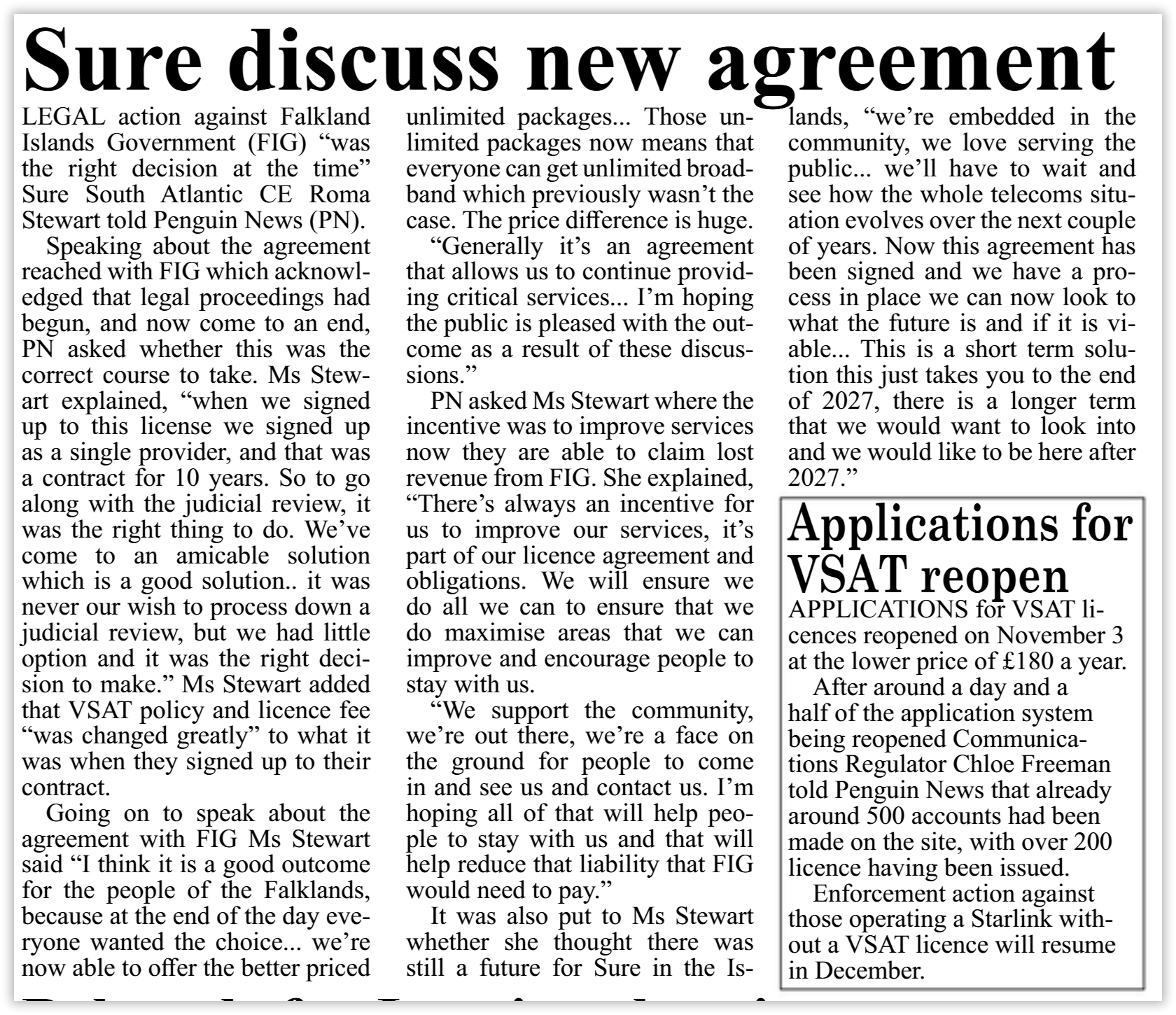 In this week’s Penguin News, Sure South Atlantic (Sure SA) shared its perspective in an interview about taking legal action against the Falkland Islands Government (FIG) over its approval for Starlink to operate in the Falkland Islands.
In this week’s Penguin News, Sure South Atlantic (Sure SA) shared its perspective in an interview about taking legal action against the Falkland Islands Government (FIG) over its approval for Starlink to operate in the Falkland Islands.
This legal challenge came at a time when the Falklands community had been eagerly awaiting improved connectivity, with Starlink’s low-orbit satellite service seen as a potential game-changer for residents, businesses, and education.
In the previous Openfalklands post, we looked at what led up to this approval decision, so if you haven’t read it, please do so before diving in here: Falklands’ telecoms: Learning From Yesterday, Building for Tomorrow. In this post, we will take a closer look at what was said in the interview.

When Sure SA decided to pursue a judicial review against FIG because “it was the right thing to do“, it was a decision that rippled far beyond the courtroom. The interview claimed this led to an “amicable solution.“ On paper, it may have been a legally sound business move, but in practice, it revealed a sharp divide between Sure SA’s corporate self-interest and community expectations.
From a legal perspective, Sure SA believed it was within its rights to defend what it considered a binding, exclusive 10-year telecommunications licence that granted it sole-provider status. However, the situation is not as clear-cut as Sure SA’s narrative suggests.
The Sure Falkland Islands’ Individual Operating Licence formally included a personal-use VSAT self-provisioning exemption, allowing individuals and FIG to operate their own VSAT systems. In practice, however, this was made virtually impossible to obtain due to an excessively complex, anti-competitive licensing process, combined with a prohibitive fee of £5,400, effectively preventing anyone from using a VSAT.

The statement in the Penguin News interview can be deemed misleading: “The VSAT policy…was changed greatly from what it was when they signed up to their contract.”
This clause fundamentally weakens the argument and the claim that Sure SA held a fully exclusive monopoly over all forms of connectivity. It didn’t, and gave FIG legitimate legal grounds to interpret the agreement as permitting the use of alternative VSAT (well, LEO in reality) providers such as Starlink for personal and FIG use. However, the inclusion of the word “personal” has had significant knock-on repercussions over the years, which have been discussed elsewhere.
In this light, Sure SA’s legal position, while procedurally correct, begins to look more like an attempt to stretch the meaning of exclusivity beyond its original intent. Judicial review, then, became less about protecting a clear business right and more about asserting dominance in an area where that right was explicitly limited.
From a business perspective, the judicial review was a classic act of corporate self-preservation. Sure SA depends heavily on monopoly control of the local telecommunications market. The emergence of low-cost, high-speed LEO satellite options such as Starlink threatened not only its revenue stream but also the very foundation of its business model. Across remote regions and islands worldwide, governments have welcomed LEO satellite systems as a way to bridge digital divides. Sure SA’s resistance, therefore, contrasts sharply with a global trend toward openness and innovation.
By taking legal action, Sure SA chose to protect its monopoly rather than support progress for the Falklands community. Even worse, FIG’s position made clear that the licence already allowed self-provision, meaning Sure SA wasn’t defending a fundamental right — it was defending a self-serving interpretation designed to protect its commercial interests at the expense of both the licence’s intent and the public good.
The most troubling dimension lies in the moral and ethical implications. The judicial review placed Sure SA in direct conflict with the very people it exists to serve. Falkland Islanders have long voiced frustration with high prices, restrictive data caps, and limited bandwidth, and many saw the arrival of Starlink and similar technologies as long-overdue progress. Many Falkland Islanders expressed dismay that legal challenges were delaying access to faster, cheaper connections that could transform education, business, and healthcare on the islands.
By taking legal action, Sure SA appeared to prioritise corporate self-interest over public progress. What made this particularly troubling was that FIG’s position — that the licence already permitted self-provision — meant the company wasn’t defending an absolute right. Instead, Sure SA was defending a narrow interpretation that served its own commercial interests at the expense of the licence’s intent and the wider community’s welfare.
In small territories like the Falkland Islands, where business and society are closely intertwined, a service provider’s moral duty extends beyond contractual compliance. The expectation is partnership, not confrontation. Sure SA’s decision to challenge FIG legally, rather than collaborate to modernise telecommunications access, created the perception that it viewed the community as a threat to its business rather than as the foundation of it.
How could it have been handled differently? Rather than reaching for the courts, Sure SA could have embraced a collaborative, transparent process with FIG and the public. Most importantly, accepting an unavoidable loss of revenue caused by a major technological upheaval affecting every terrestrial carrier worldwide. Open discussions and acceptance about how Starlink and other emerging technologies might coexist with Sure SA’s infrastructure would have demonstrated adaptability and goodwill.
Such an approach would have maintained legal integrity while showing social conscience, fostering a sense of partnership rather than resentment.

Ultimately, Sure SA’s judicial review may have preserved its short-term contractual footing, but it came at a longer-term cost: diminished trust. In an age where connectivity defines opportunity, a telecom provider’s moral legitimacy is as vital as its technical capability. Legal correctness can defend a licence, but only ethical alignment with the community ensures a lasting place beyond December 2027 and the expiration of the exclusive licence.
Editor’s note: I will be in Stanley after the 24th of November 2025 through to election day, so I look forward to discussing the positive future of Falklands telecommunications with many of my readers while there. You may be able to recognise me!


